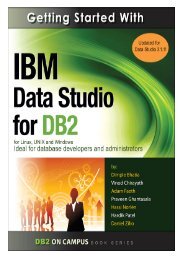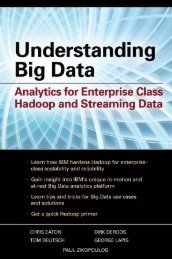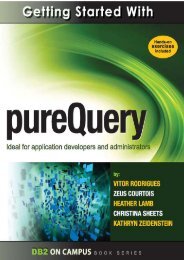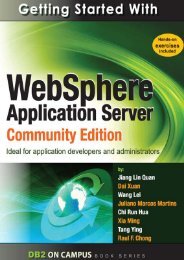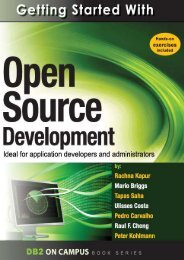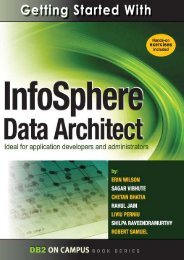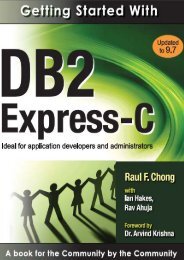Managing Computers in Large Organizations
You also want an ePaper? Increase the reach of your titles
YUMPU automatically turns print PDFs into web optimized ePapers that Google loves.
<strong>Manag<strong>in</strong>g</strong> Microcomputers <strong>in</strong> <strong>Large</strong> <strong>Organizations</strong><br />
http://www.nap.edu/catalog/167.html<br />
About this PDF file: This new digital representation of the orig<strong>in</strong>al work has been recomposed from XML files created from the orig<strong>in</strong>al paper book, not from the<br />
orig<strong>in</strong>al typesett<strong>in</strong>g files. Page breaks are true to the orig<strong>in</strong>al; l<strong>in</strong>e lengths, word breaks, head<strong>in</strong>g styles, and other typesett<strong>in</strong>g-specific formatt<strong>in</strong>g, however, cannot be<br />
reta<strong>in</strong>ed, and some typographic errors may have been accidentally <strong>in</strong>serted. Please use the pr<strong>in</strong>t version of this publication as the authoritative version for attribution.<br />
MANAGING MICROCOMPUTERS AND END-USER COMPUTING SOME CRITICAL<br />
ISSUES<br />
There is no reason to relax these for the benefit of end users. The only way<br />
master files should be updated is by the normal, well-controlled transaction<br />
process<strong>in</strong>g system.<br />
Transfer of data and programs. What about files that a user ma<strong>in</strong>ta<strong>in</strong>s<br />
<strong>in</strong>dependent of the ma<strong>in</strong>frame systems? Should the data and programs<br />
developed by an end user be considered private, scratch pad material or should<br />
some mechanism be <strong>in</strong>stalled to allow shar<strong>in</strong>g of this material? If the end user is<br />
work<strong>in</strong>g on a ma<strong>in</strong>frame the data and programs are at least accessible, even if<br />
they are not properly structured and documented. But data and programs<br />
developed on a micro may be as <strong>in</strong>accessible as those on paper. Some<br />
organizations are <strong>in</strong> fact tak<strong>in</strong>g the attitude that the data and programs<br />
developed by an end user on a micro are the same as material on paper. If the<br />
user leaves, the new occupant must develop his or her own rout<strong>in</strong>e and data.<br />
Peers who need to do similar process<strong>in</strong>g must develop their own tools, perhaps<br />
with the <strong>in</strong>formal help of the first end user. The results of the end user's<br />
analyses are submitted <strong>in</strong> reports (with appropriate appendixes) <strong>in</strong> the usual<br />
way. The data and rout<strong>in</strong>es not <strong>in</strong>cluded <strong>in</strong> the appendixes are no longer of<br />
<strong>in</strong>terest; they are throw-away materials.<br />
If the organization decides that it does want to capture programs or data<br />
that are on a micro and judged to be valuable, adm<strong>in</strong>istrative procedures must<br />
be <strong>in</strong>stituted just as they are for data process<strong>in</strong>g professionals. These will not be<br />
easy to enforce, however, because there are many decentralized end users who<br />
have little <strong>in</strong>terest <strong>in</strong> data process<strong>in</strong>g's problems. The only other alternative is to<br />
prohibit the development of “systems” on micros and allow such development<br />
only <strong>in</strong> a ma<strong>in</strong>frame context.<br />
Resource use and charge-back. If we provide many end users with the<br />
opportunity to use computers, and especially if we make it easy for them with<br />
effective languages and other software, the demand for computer capacity will<br />
soar. The issue is whether additional capacity is a good <strong>in</strong>vestment. If end users<br />
are help<strong>in</strong>g to make decisions that significantly <strong>in</strong>crease the effectiveness of the<br />
organization, the service it provides, or its profits, the cost of the computer<br />
resources may be well justified.<br />
But only management can justify this resource use. To do this, it should<br />
know what the end user is do<strong>in</strong>g and how that work contributes to the<br />
organization. The data process<strong>in</strong>g people, who normally have to justify the<br />
<strong>in</strong>crease <strong>in</strong> capacity, do not know the<br />
90<br />
Copyright © National Academy of Sciences. All rights reserved.




